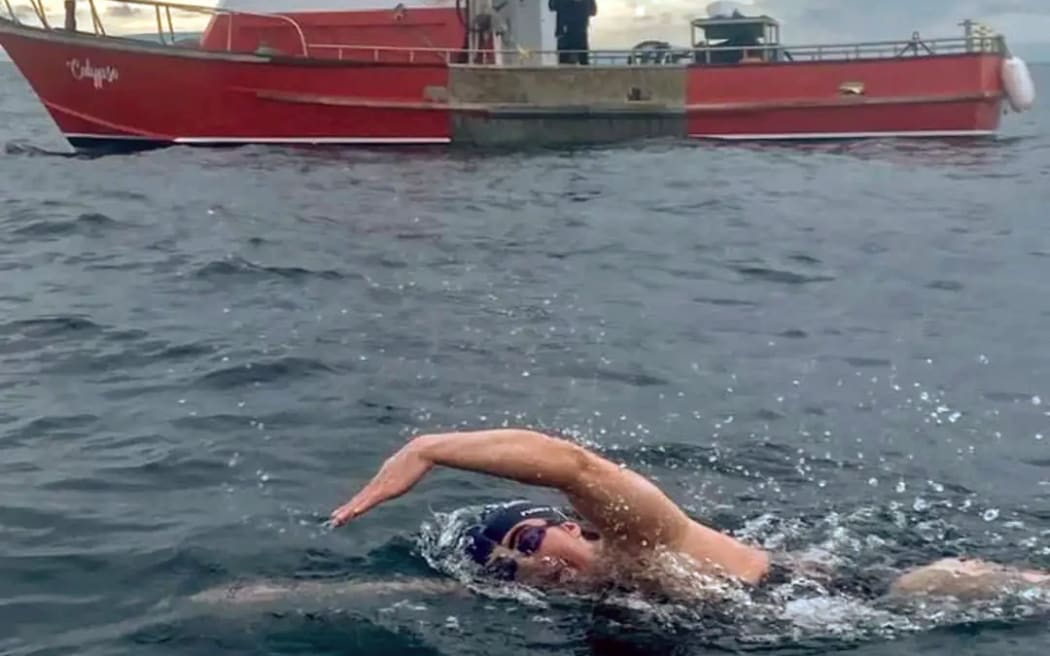
Wellington librarian and swimmer Corrina Connor Photo: Corrina Connor / Linkedin
Corrina Connor finds "a kind of purity" in long-distance ocean swimming in just regular togs and a swimming cap
This April, the Wellington librarian swam the historic 26.9km Fouveaux Strait between the South Island and Stewart Island.
Corrina tells Kathryn Ryan that while swimmers use all sorts of mindfulness techniques and mantras to keep them going mentally, counting is what works for her.
"I just count to 100 over and over again, so I count 100 strokes and then I'd start again. And then I think 'Well, I wonder how many times I can count to 100, before my next feed' and then you just keep on going."
Connor – who is also a cellist and Oxford-educated historical musicologist – learned to swim when I was very young but lost interest in her teens. Then, while studying in London, she moved next door to an outdoor pool where a triathlon squad did their training.
Feeling "ready to get back in the water" she did just that. A couple of years later, back in Wellington, Connor joined a local swimming squad and met her first open-water swimmers.
Although Connor swims during the Wellington winter – when the sea temperature gets down to 10 or 11 degrees – the temperature of Fouveaux Strait was a worry, as was the very low air temperature on the morning of her swim.
Luckily for Connor, the sea was 15 degrees on the day.
"The day before, when I arrived in Invercargill and got off the plane, they said 'Oh, the air temperature in Invercargill today is five or six degrees and I thought 'Oh no'. But in fact, the next morning when we set off in the boat it was pretty chilly and it did make the water initially feel quite warm, sliding into 15 degrees."
There are things you can do to "almost trick" your body into feeling warm in cold water, she says.
"In my Fouveaux swim, all my drinks that I had every half hour were always warm because that helps to keep your core warm. And of course, if your core is warm then that means the rest of your body is happier. So that's very helpful. The other thing you just have to do is to sort of keep generating as much heat as you can by swimming."
Once underway, Connor prefers not to receive any information about her progress.
"I don't want anyone to tell me 'You've done this much. You've got seven and a half hours to go.' I don't need to do that. But I was, through the feeds, keeping track."

Marathon swimmer, cellist, and librarian, Corrina Connor mid-swim. Photo: Corrina Connor
As she reached her destination, though, Connor was ordered to get out of her head and back on task.
"I saw this very funny yellow fish this sort of fat, wobbly fish, and it just came swimming into my peripheral vision. And I thought 'I wonder what sort of fish that is'. And I was pondering this, and then I thought, 'Gosh, David Attenborough would love to know about this, He's seen plenty of fish but he's never seen this one in this place. So I then started composing a very long letter to David Attenborough in my mind, which I still haven't actually written or sent, because I then forgot what I had written, but it was a tremendous letter. And then, while I was in the midst of this, I was stopped and they said 'You've got one kilometre to go. So you know, put your foot down and get on with it' … It was a bit of a gear change."
Despite feeling hyper-sensitive to small changes in the temperature, current and waves, Connor says thoughts of "things that might be down there with teeth" don't set her back much when she's swimming.
"Once you've spent long enough in that mesmeric rhythmic state, your mind just goes off on its own little tangent. But it's hard to sort of provoke yourself into that state. It's just something that isn't nice when it happens. It is like having a dream … and then you [awaken and] think 'Well, I'm just I'm just swimming along'."
It was "wonderful", though, that panic didn't visit her at any point during the 9-hour-and-21-minute Fouveaux Strait swim.
"There were a couple of bits where I thought you know, I'm suddenly feeling a bit cold or my cap is too tight but overall I was very happy, I enjoyed my snacks and yeah it was just a very comfortable feeling."
Connor has learnt to be comfortable in water temperatures even colder than the Wellington winter sea now. She also does 'ice swimming' in water below 5 degrees.
Low temperatures like this cause everything in the human body to slow down, Connor says.
"The interesting thing is you feel like you're exerting yourself at full tilt. But in fact, when you get out and see the time you realise you're actually swimming very slowly in comparison. So everything just gradually slows down.
"I think what happens when you get into that water, is everything goes numb surprisingly quickly, including your face, which is a bit awkward because it means it's very easy for water to go in when you breathe you're not using your lips."
Long-distance swimming complements and can help with the "broad range of activities" in Connor 's life.
"When I was finishing my doctorate and I was swimming a lot at the same time, I often had very good ideas when I was swimming that I had to remember until I got back onto dry land ... You enter into that different mental space and you can just let your thoughts flow. And some of them are quite good. Some of them are not."'
To prepare for the Fouveaux Strait swim, she swam 35 to 40 kilometres a week and says "plenty of hard work in the pool" seems to work well, too.
"That's where you maintain your pace and you maintain your technique. But then it is really good to get out in the sea and do some quite long swims."
On Foveaux Strait, adverse weather – in the form of strong winds that create "very sharp, vertical waves" – often makes things really unpleasant for swimmers, but Connor got lucky.
"The day that I went, it was this gorgeous swell, there were no whitecaps, there were no waves, and it was just lovely. But I gather from the skipper and crew that unless it's like that, it's very difficult to swim because it would all be just flinging you around."
She also got to swim through some amazing bioluminescence – the light-emitting pigment produced by sea organisms.
"It was every single colour you can imagine, just twinkling like a kaleidoscope and that was just phenomenal. Bits of it got stuck on my shoulder, they were stuck on my arms, and it was so beautiful. After a while, it became a bit overwhelming so I had to shut my eyes … it was just extraordinary how bright it was."

